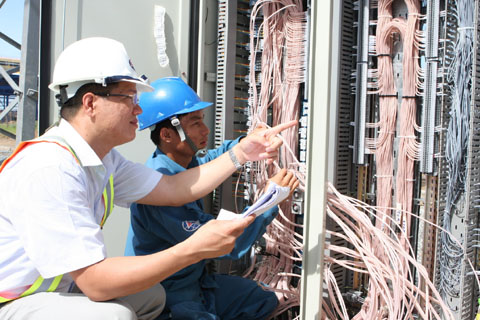Knowledge to be Attained after Graduation from College in Industrial Electrical Engineering
From February 10, 2019, Circular 48/2018/TT-BLDTBXH issued by the Ministry of Labor, Invalids and Social Affairs (BLDTBXH) stipulating the minimum knowledge volume and competency requirements that learners must achieve after graduating from intermediate and college levels in the fields of electrical engineering, electronics, and telecommunications will take effect.

Knowledge Required After Graduation in Industrial Electricity - Illustrative Image
As stipulated in the Regulation on minimum knowledge volume, competency requirements that learners must achieve after graduating at intermediate and college levels in industrial electricity, issued together with Circular 48/2018/TT-BLDTBXH, the minimum knowledge required after graduating in industrial electricity at the college level includes:
- Explain standards ensuring labor safety, electric safety for people and equipment;- Explain the structure, functioning principles, properties, and applications of electrical equipment, electrical apparatus, and electrical materials;- Describe methods to measure parameters and basic quantities of electric circuits;- State fundamental concepts, laws, and theorems in direct current circuits, alternating current circuits, and three-phase alternating current circuits;- Analyze conventional symbols on electrical drawings;- Describe the structure and working principles of electrical machines;- Explain the technical standards of common electrical material groups according to Vietnamese and IEC standards;- Explain concepts about ISO 9001:2015 standards;- Describe methods to calculate parameters, and complete winding of small power transformers as required;- Analyze schematic diagrams of electrical systems of machine tools such as lathes, milling machines, drills, planers, and manufacturing machines like conveyors, cranes, elevators, electric furnaces...;- Analyze principles of various sensors and sensor circuits;- Explain principles of power supply transmission systems;- Identify electromechanical devices in electric drive systems;- Explain principles and methods for controlling the speed of electric drive systems;- Analyze structure and principles of typical devices such as soft starters, inverters, and converters;- Explain the structure, symbols, properties, and applications of passive components;- Explain the structure, symbols, properties, applications of semiconductor devices, ways to assemble components in circuits, and how to determine technical parameters of components;- Describe the structure of simple electronic circuits using electronic components and their operating principles;- Describe the usage of measuring devices and welding equipment;- Explain the structure and operating principles of power electronic components;- Explain processes in maintaining and replacing power electronic components to meet technical standards;- Explain the structure and operating principles of various PLC programmable control systems from different manufacturers;- Explain the structure and operation principles of SCADA (Supervision Control And Data Acquisition) systems in industry;- Compare the advantages and disadvantages of PLC controllers with other systems;- Describe the main parts' structure of control systems: language, link, timing of different PLC types;- Analyze principles and structure of electro-pneumatic control systems;- Explain the concept, role, and classification of industrial communication networks;- Explain basic content in communication engineering: transmission modes, network structure, protocol architecture, bus access, data preservation, bit coding, transmission techniques;- Explain the basic components of a network system;- Explain structural characteristics of some typical bus systems: Profibus, CAN, Modbus, Interbus, AS-i, Ethernet;- Analyze design and installation drawings of electrical systems;- Explain basic knowledge of politics, culture, society, law, national defense and security, physical education according to regulations.
Details are available in Circular 48/2018/TT-BLDTBXH, issued on December 28, 2018.
Le Vy
- Responsibilities of officials of the Ministry of Finance of Vietnam when they are issued Official Passports from November 19, 2024
- 06 solutions to enhance the effectiveness of social policy credit in the new phase in Vietnam
- Financial support level for the purchase and repair of transportation vehicles for the Economic - National Defense Corps in Vietnam from December 30, 2024
- Financial support levels for purchasing and repairing of medical equipment for the Economic - National Defense Corps in Vietnam from December 30, 2024
- Latest regulations on management and use of passports for officials and public employees of the Ministry of Finance of Vietnam
- New regulations on the procedures for veterinary sanitation inspection in Vietnam from January 6, 2025
-

- Responsibilities of officials of the Ministry ...
- 16:00, 23/11/2024
-

- 06 solutions to enhance the effectiveness of social ...
- 15:32, 23/11/2024
-

- Guidelines for registration and organization of ...
- 11:53, 23/11/2024
-

- Contents of audit service quality control in Vietnam
- 11:00, 23/11/2024
-

- Acts in violation of Law on Independent Audit ...
- 10:30, 23/11/2024
 Article table of contents
Article table of contents
